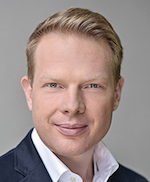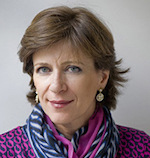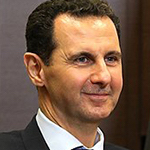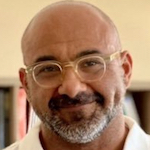"There is a more level field internationally now, as well as an overall higher level of expectations in the quality of the strategy, execution and measurement of public relations,” said Patrik Schober, Group Chair for Worldcom Public Relations Group and Managing Partner of PRAM Consulting. “We are truly living in a global marketplace and in real-time communications.”
|
|
The global network with the most member firms, Worldcom, which had combined revenues of more than $273 million in 2016, added to its global reach with the recent addition of two new members: Warsaw, Poland’s Made in PR and Istanbul, Turkey’s OptimumBrand. Schober attributed the stability and growth of the network to the strong level of partnership and collaboration between its member firms. He said agency satisfaction with the network has risen from 70 percent to 80 percent year over year, a trend that allows it to work from a strong base as it tackles a transforming global marketplace.
|
|
Those transformations, according to Schober, run across several categories. First among them is the increasing speed with which news traverses the globe, along with the rise of the “citizen journalists” who have upended the traditional news-gathering structure. Those factors “make strong crisis planning and management a premium,” he said. “PR’s ability to help brands in the one-to one relationship vs. the one-to-many will be critical.”
PR demand grows amid uncertainty
Changing political situations across the globe will also impact PR practices, Schober added. “With Brexit, financial will be an interesting sector in EMEA, and political affairs is obviously a growing and dynamic global category for PR,” he said. “Agencies are expanding their services, hiring and training practices to meet the diverse demands of today’s hyper-connected world. Having a global perspective but also the ability to have feet on the ground that are familiar with the politics, culture and customs of different regions will help agencies better serve global brands and function in our global marketplace.”
|
|
PROI Worldwide Founding Partner and Global Managing Director Allard W. van Veen sees a promising future in many locations around the world. With combined net fee income of more than $700 million in 2016, the network, which has been in operation since 1970, is thriving. Having brought on Bangkok, Thailand firm Midas PR Group and Sydney, Australia based Filtered Media earlier this year, PROI has a presence in more than 100 cities in 50 countries.
From a presence in India/South Asia that racked up 66 industry awards last year to the six members based in African cities, the network has kept expanding its global footprint.
“PROI has matured in most parts of the world,” van Veen said, “but we see continued growth in, and are investing heavily, in emerging and recently established economies in Africa, some parts of Eastern Europe, and a few remaining parts of Asia.”
While PROI’s growth has been steady, the network has taken a measured approach to its expansion. “Since our founding,” van Veen said, “we have focused on three strategic initiatives to grow our partnership: identifying quality independent agencies offering strong thought leadership; marrying large, mid-size and smaller agencies; and limiting our growth worldwide.”
When it comes to the challenges presented by growth on a global scale, the network’s executives particularly note the need to keep each firm’s offerings aligned with local and regional constraints, while also maintaining a solid standard of quality and consistent fee levels. To carry out those goals, they cited the need to attract the right kind of talent: people familiar with international business, tech-savvy individuals, and those who have mastered such in-demand skills as analytics and measurement.
To PROI management, the market sectors where growth is most likely change with the locale. According to Jean Leopold Schuybroek, PROI’s Director, Global Development, many of the economies of Asia and Africa exhibit a strong demand in the consumer goods area, while in Europe the desired competencies are often in such fields as litigation communication. rbb President and PROI Worldwide Vice-Chairman, The Americas, Lisa Ross pointed to technological advances in the healthcare sectors as having particular traction in Japan, Korea and Israel, as well as in the U.S.
On a global scale, van Veen stressed the continued importance of reputation management. “Trust will become the major underlying factor by which future communications programs will be judged,” he said.
Learning to appreciate differences
For PR Boutiques International, the past year was also one of solid growth. With the addition of Nucleus PR, the network’s first member from India; Amsterdam tech PR agency Lubbers de Jong; Boston’s DPA Communications and VRoy Communications from Montreal, the network’s membership now stands at 37 firms, covering 14 countries.
“We’re very focused on growing our international representation overall and in our leadership,” said PRBI President Lee Weinstein. “We attribute the successful growth of PRBI to the active involvement of our members. We have dedicated members who are very committed to taking this organization to the next level.”
|
|
Weinstein noted that progress is evident across the board in the PR profession on an international level. “Probably the biggest change is cultural understanding and people from different countries appreciating their differences and similarities, and understanding what works,” he said.
PRBI expects Europe to be a strong growth region in the near future. “We’re just starting a PRBI Network among our members in Europe,” he said, “and we are expecting that group to work well together in developing new business and recruiting new members.”
The market sector in which Weinstein thinks there is a particularly strong opportunity for growth is healthcare. “The forecast in Europe is that this market sector will be growing faster than any other,” he said. “This will have a big effect on employability, leisure activities, healthy lives and more. The purpose of PR is to explain the complexity of this issue.”
What the PR industry needs in order to carry out that purpose, Weinstein said, is an increased level of communication and cooperation. He thinks that PRBI has come a long way toward realizing that goal. “There is more cross-cultural understanding, seamlessness and efficiency among our member agencies, which is of great benefit to both our members and our clients.”
Emphasizing international perspective
Cross-cultural understanding is also a central concept for Catherine Kablé, Managing Partner at Kable Communication and Chairman, PR World Alliance.
When new members at PRWA mention the network’s advantages, Kablé said, one of the things that keeps coming up is that they “enjoy the possibility of sending consultants abroad to partner firms for training.” Gaining a broader international perspective is seen as more than just an add-on — it has become a key skill to help firms function in the global economy.
PRWA added to its global reach over the past year with the addition of Marcommit in The Netherlands and Svoboda PR & Consulting in Austria, bringing it up to 15 members. What all of those members face, Kablé said, is a communications environment characterized by rapid changes. “Innovation is the driver everywhere,” she said. “The digital revolution continues to impact every aspect of our industry across all markets.”
|
|
Among the changes she noted are the ever-increasing importance of social media and the 24/7 nature of today’s fractured media environment. “Media are adapting their business models with varying degrees of success to cut costs yet provide relevant and reputable information,” Kablé said. “The result is deeply impacting PR agencies — fewer journalists to contact and less time per journalist for our contacts and information.”
And even though the influence of the internet has tended to soften the differences between locales, she stressed the importance of staying sensitive to the particular characteristics of each market. “Don’t discount the importance and nuances of local markets, habits and contacts,” she advised.
Balancing global and local
IPREX Global President Andrei Mylroie called attention to the fine line between the global and the local that agencies must walk in today’s PR landscape. “There’s greater tension between the need for a ‘common language’ and the need to address markets and cultures individually,” he said. “And having process and relationships in place to allow for fast and strategic decision-making is even more necessary to avoid local problems evolving chaotically.”
|
|
IPREX added Chilean strategic communication agency Comsulting and SalterMitchell, a public relations and behavior change marketing agency headquartered in Tallahassee, to its roster this year. Overall, the network’s firms experienced a 4.3 percent rise in revenues in 2016.
Mylroie sees reason for optimism in all almost all areas of the world. “Most of our North American partners are experiencing especially strong growth, tied in part to a strong US economy,” he said. “Beyond this though, in our recent annual partner meeting there was a lot of discussion about North Africa and the Middle East, driven by improving economic circumstances and investment from China in the region (especially Africa) and access to markets with major growth potential. Many of our European partners are also feeling more optimistic about a strengthening economy.”
Like many of the other network executives, Mylroie said that he expects the healthcare sector to continue its strength in the near future. Other areas in which he foresees increased activity are sustainability and sustainable energy, construction / infrastructure, transportation, cyber security and tourism.
To succeed in this environment, he said, firms need to focus on more than just regional differences. “Much of the shared work among IPREX partners has been not just geographic in nature, but firms working together because they have complementary functional expertise.”
The Public Relations Global Network hit the 50-member mark this year with the addition of North Carolina-based S&A Communications and asoluto, a Vienna, Austria firm that offers both traditional PR and a wide range of digital services. The network, which had $101 million in revenues, also introduced a redesigned website that it said will give prospective clients “one-stop access to a curated suite of PR services,” according to PRGN President Christina Rytter, who is the Managing Director and Founder of Copenhagen, Denmark’s Scandinavian Communications.
|
|
That interest in promoting ease of communication, Rytter said, requires helping clients negotiate the many levels of technology. She notes that firms that want to be successful in today’s global marketplace need to “move away from traditional silo-based thinking toward working on a cross-channel level.” The growth of video as a communications medium is something that she has noticed across the board.
Rytter sees technology, healthcare and renewable energy as major growth areas in Europe. While she, unlike several other network leaders, does not predict strong growth in Europe, she said that in Scandinavia, where her firm is located, things are slowly picking up.
Execs across PRGN seem to be pretty much in agreement over the market sectors that show the most promise in the near future. In addition to the fields Rytter calls attention to, travel, real estate and cyber security are mentioned as areas that are increasing in importance on a global scale. In regards to areas that are poised for growth, the expansion of markets in China, Southeast Asia and parts of Central and South America — particularly Argentina — were mentioned. Strength in such tech hubs as Boston and Seattle was also predicted.
When it comes down to the main trait required for success on an international scale in today’s international market, several PRGN members noted the importance of communicating to clients how vital a global view is to a company’s success on any level. “The world is becoming a much smaller playground,” said Leeza Hoyt, President of PRGN member firm the Hoyt Organization. To deal with that, she said, firms need to combine “local knowledge with global reach.”


 Patrik Schober
Patrik Schober Allard W. van Veen
Allard W. van Veen  Lee Weinstein
Lee Weinstein Catherine Kablé
Catherine Kablé Andrei Mylroie
Andrei Mylroie  Christina Rytter
Christina Rytter
 Edelman is providing communications support to Panama’s Ministry of Commerce and Industries under an agreement capped at $97,100 per month.
Edelman is providing communications support to Panama’s Ministry of Commerce and Industries under an agreement capped at $97,100 per month. Ballard Partners has recruited State Department veteran Matt Bryza as a senior policy advisor.
Ballard Partners has recruited State Department veteran Matt Bryza as a senior policy advisor. Teneo has extended its contract with the Salama Bint Hamdan Al Nahyan Foundation for an additional four months to July 31, adding another $1.8M in fees to the New York firm’s coffers.
Teneo has extended its contract with the Salama Bint Hamdan Al Nahyan Foundation for an additional four months to July 31, adding another $1.8M in fees to the New York firm’s coffers. The Syrian Kurdish militia recruits Jim Dornan Strategies to press Congress for continued support in their battle against ISIS and Syrian president Bashar Assad.
The Syrian Kurdish militia recruits Jim Dornan Strategies to press Congress for continued support in their battle against ISIS and Syrian president Bashar Assad. The Government of Hungary has hired Strategic Improvisation Inc. to generate positive media coverage and combat negative press coverage of the Central European country. (6 reader comments)
The Government of Hungary has hired Strategic Improvisation Inc. to generate positive media coverage and combat negative press coverage of the Central European country. (6 reader comments)


 Have a comment? Send it to
Have a comment? Send it to 
No comments have been submitted for this story yet.